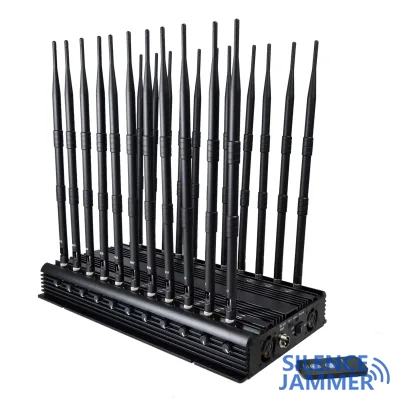On May 5, 2024, more than 500 households and more than 50 shops in the C4 and C5 blocks of Janakpuri in Delhi suddenly encountered the dilemma of a complete communication paralysis. Behind all this are 15 powerful cell phone jammers deployed by Tihar Prison to combat the illegal use of mobile phones by prisoners. However, the radiation range of these GPS jammers unexpectedly expanded, seriously affecting the communication signals of the surrounding communities, and putting the lives and businesses of residents and merchants in trouble. Wifi jammerThis incident revealed the conflict between prison management and community interests, and also raised new thoughts on the reasonable use of signal jammers.
1. The original intention of Tihar Prison and Jammers
As one of the largest and most secure prisons in India, Tihar Prison holds about 20,000 prisoners, including many notorious criminals and gangsters. In recent years, prisoners have kept in touch with the outside world through smuggled mobile phones, and even manipulated external criminal activities, making it difficult for prison managers to guard against them. Therefore, in order to eliminate illegal communications, the prison management department installed 15 jammers to block the prisoners' mobile phone signals. However, this measure has had an unexpected side effect during its implementation, affecting the communication network for several kilometers around the prison.
2. People's livelihood difficulties caused by communication interruption
Residents living in Janakpuri C4 and C5 blocks have suffered greatly. Vijay Batra, 55, shared his plight: "Whenever I need to receive a one-time password (OTP) for mobile banking transactions, I have to leave my home and ride 500 meters to find a signal." Batra's family life has become more inconvenient due to signal problems, and he is not the only victim. Local residents generally report that they feel helpless and uneasy when they cannot make calls in emergencies.
Not only residents, but local merchants are also facing severe challenges. Pawan Singhal and his wife run a shop in C5B block, but due to signal interference, even Wi-Fi calls and GPS navigation frequently fail. Deliverymen are delayed in delivery due to the inability to obtain navigation information in time, and customers cannot contact merchants, resulting in order cancellations and business losses. Singhal lamented: "Business has been greatly affected, especially when online payments and telephone communication are required."
3. Chain reaction in the real estate market
Communication problems not only affect daily life and business operations, but also have an impact on the local real estate market. Due to signal problems, potential buyers are deterred, resulting in a sharp drop in housing prices. Real estate agent Pawas Jain pointed out: "Although the infrastructure of these houses is intact, buyers often give up buying after experiencing communication problems themselves."
4. Challenges and responses of prison management
Faced with the escalating communication difficulties, the Delhi Prison Administration has realized the seriousness of the problem. Sanjay Beniwal, director of the Delhi Prison, said that in addition to jammers, the prison has also installed a harmonious call blocking system (T-HCBS) to further prevent prisoners from using mobile phones. Despite this, prisoners still found the blind spots of the jammers and continued to contact the outside world through smuggled mobile phones. According to statistics, in 2023, a total of 350 illegal mobile phones were seized in three prisons in Delhi, reflecting the control loopholes within the prisons.









